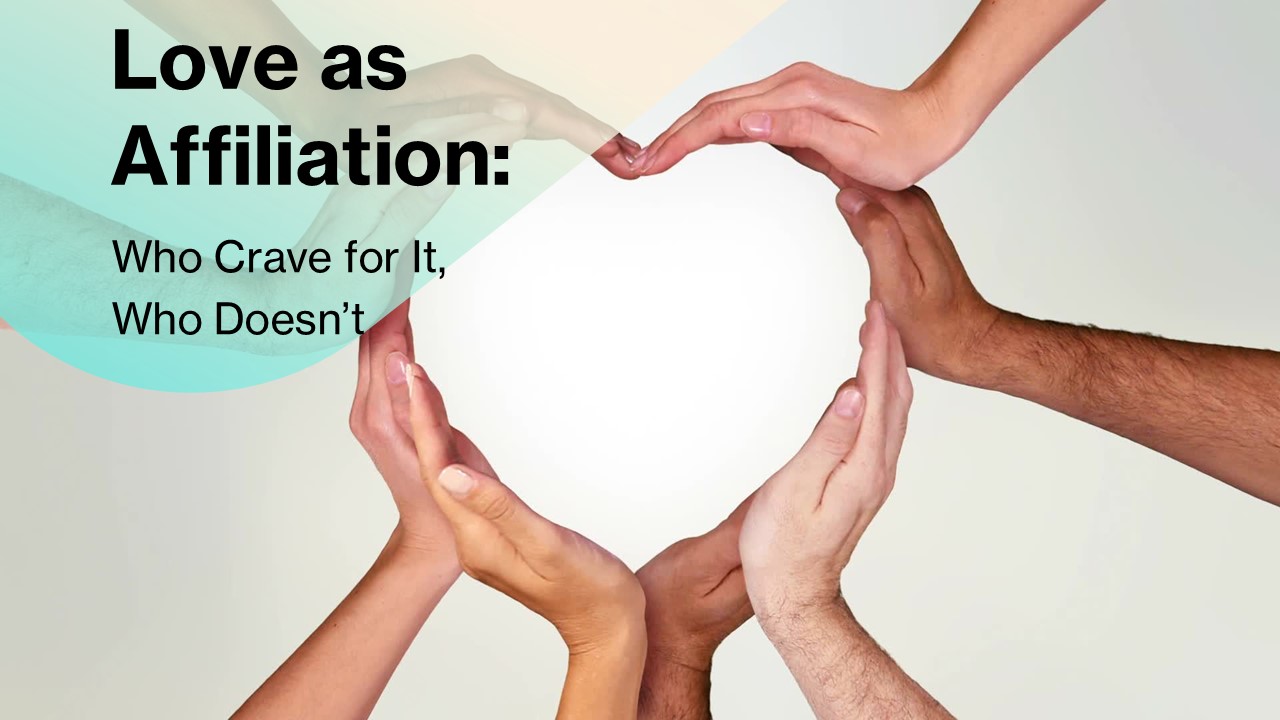Many people, as social animals, experience the need for love as longing for affiliation with others. Why do some men and women experience this need for connection more intensely than others? Why do some crave affiliation in love while others do not? Individual differences in the need to belong may be an answer.
Physiological and Neural Mechanisms of Affiliation
Studies in recent years have revealed that the experience of affiliation and pair bonding involves patterns of physiological mechanisms and brain activation different from other experiences of love. In particular, research showed that the hormone oxytocin plays an important role in the functioning of the brain system associated with prosocial behavior and interpersonal bonds, such as affiliation (see for review, Quintana et al., 2019; Shobitha & Agarwal, 2013).
A basic feature of human life is the need to belong to a group. People want to create social connections. They have the desire to bond and experience a psychological drive for interpersonal affiliation with significant others. Studies have shown that our affiliation with others are parts of love in various kinds of relationships (Karandashev, 2022).
Why Do People Have a Need for Affiliation?
The need for affiliation is deeply rooted in our evolutionary history. The notion of love as affiliation in a broad sense is present in many cultures. It may have culturally specific meanings (Karandashev, 2022).
The need to belong is a basic motivation that drives individuals into social relationships. American researchers Roy Baumeister and Mark Leary emphasize that forming and maintaining strong and stable relationships is important for people’s well-being. This need for affiliation motivates us to pursue interpersonal relationships, friendships, and close relationships with family and loved ones (Baumeister & Leary, 1995).
Affiliation provides various psychological advantages that increase our overall well-being, such as the feeling of security and support that our group membership brings. Having dependable others—be they family, friends, or loving partners—inspires a sense of security and confidence in confronting life’s challenges. Feeling valued and accepted by others in a group boosts our sense of self-worth.
Who Are Those Individuals Who Need Affiliation Less Than Others?
Some people appear to need fewer social connections, even though the majority of people have a strong need for affiliation. Instead of looking for larger social networks, these people frequently prefer to be alone or have a small number of close relationships. Gaining knowledge about the factors that contribute to this decreased need for affiliation can help one better understand the variety of social behavior that exists among people.
Personality Traits which Determine Our Affiliation Needs
Studies have found that specific personality traits can affect a diminished need for affiliation. In this context, individuals with introverted traits are generally more reticent, prefer solitary pursuits, and may experience fatigue from prolonged social engagement. This does not imply a lack of appreciation for relationships; instead, they generally favor profound, individual connections over extensive group engagements. Research on a personality dimension of introversion versus extraversion has revealed that introverts may possess a diminished threshold for social stimulation, resulting in a decreased need for affiliation.
Independence is another personality trait associated with a reduced need for affiliation. Self-sufficiency and autonomy are valued by those with high independence scores, who frequently choose to rely on themselves rather than ask for help from others. Though it may also result in fewer social connections and a lower perceived need for affiliation, this trait can be helpful in promoting resilience and self-efficacy.
How Culture Can Influence People’s Affiliation Needs
Cultural factors may also affect the extent to which individuals pursue affiliation. Individualistic cultures, exemplified by the United States and numerous Western European nations, prioritize independence, self-sufficiency, and personal accomplishment. Individuals nurtured in these cultures may internalize these values, thereby attributing diminished significance to group affiliation and social bonding. This cultural focus on autonomy may lead to a diminished need for affiliation as individuals prioritize personal objectives and self-reliance over communal connections.
Conversely, collectivist cultures prioritize group cohesion, familial connections, and communal bonds. Individuals from these cultures tend to prioritize social connections and sustain intimate relationships, indicating a heightened need for affiliation.
How high or low is your need to belong?
How do your personality traits or culture affect your need to belong?
References
Baumeister, R. F., & Leary, M. R. (1995). The need to belong: Desire for interpersonal attachments as a fundamental human motivation. Psychological Bulletin, 117, 497–529.
Karandashev, V. (2022). Cultural typologies of love. Cham, Switzerland: Springer.
Quintana, D. S., Rokicki, J., van der Meer, D., Alnæs, D., Kaufmann, T., Córdova-Palomera, A., … & Westlye, L. T. (2019). Oxytocin pathway gene networks in the human brain. Nature communications, 10(1), 1-12.
Shobitha, M., & Agarwal, J. L. (2013). Hypothesis formulation for integrated neuroendocrinal mechanisms for pair bonding, romantic love, maternal and paternal love. International Journal of Physiology, 1(1), 73–78.
